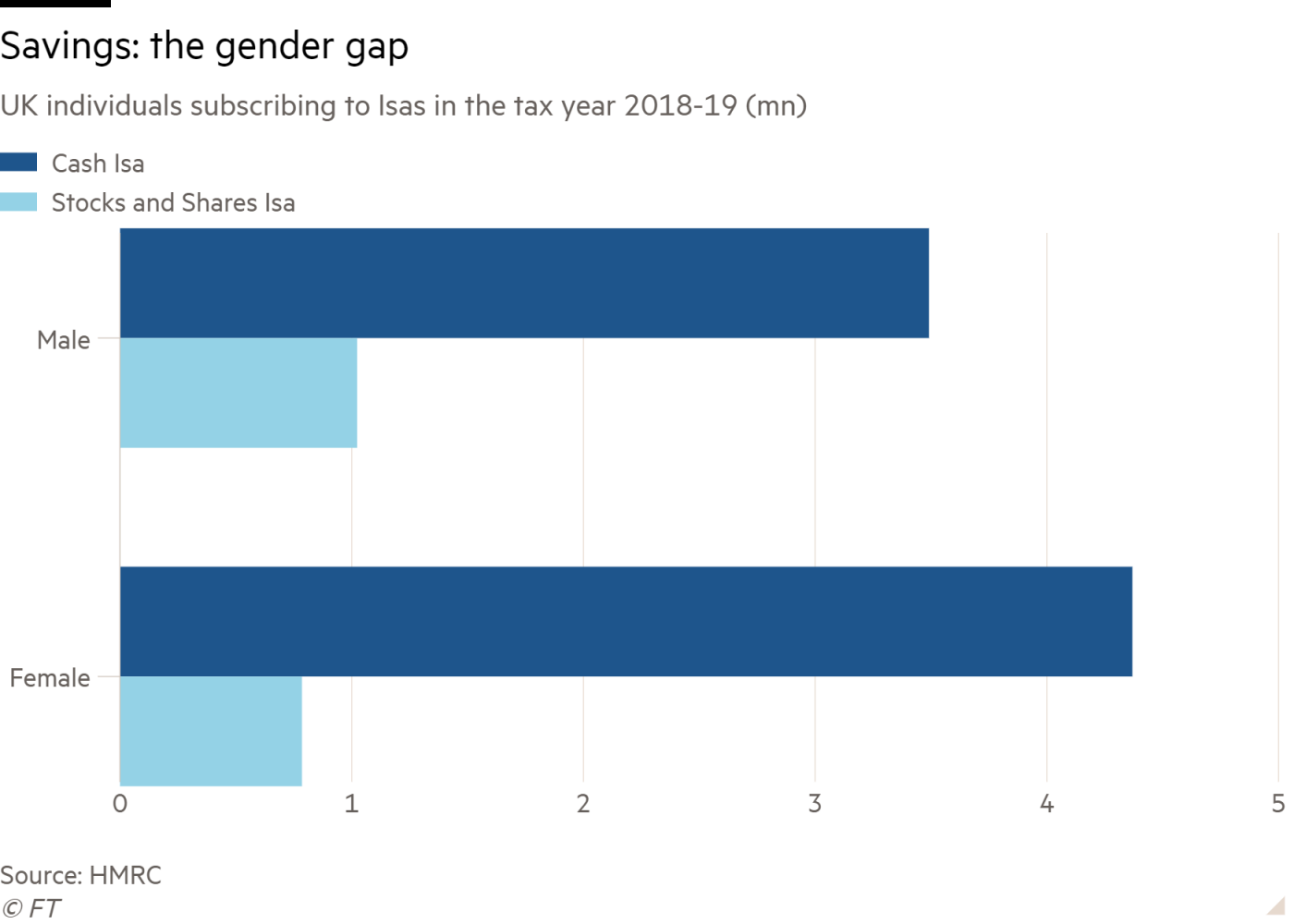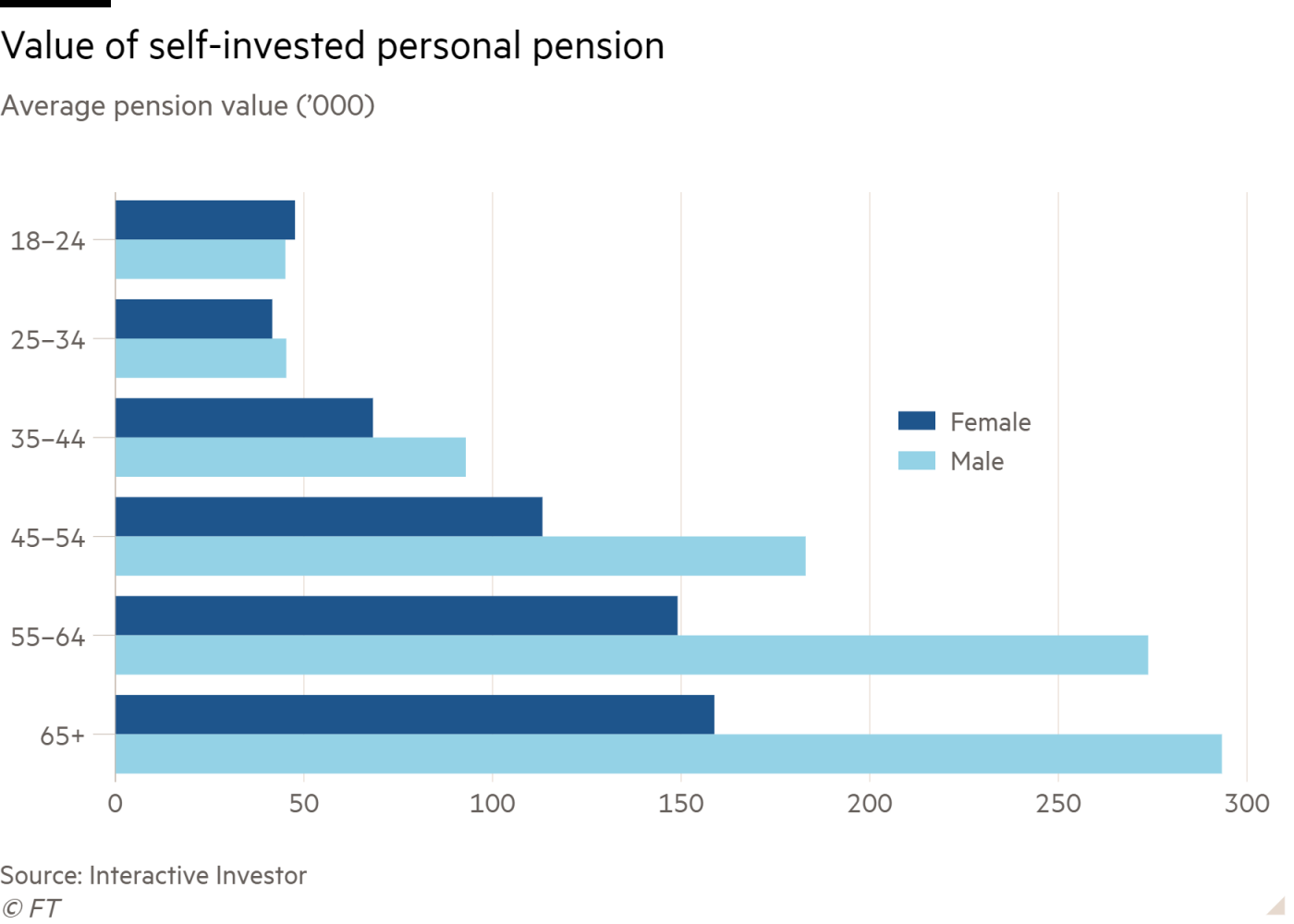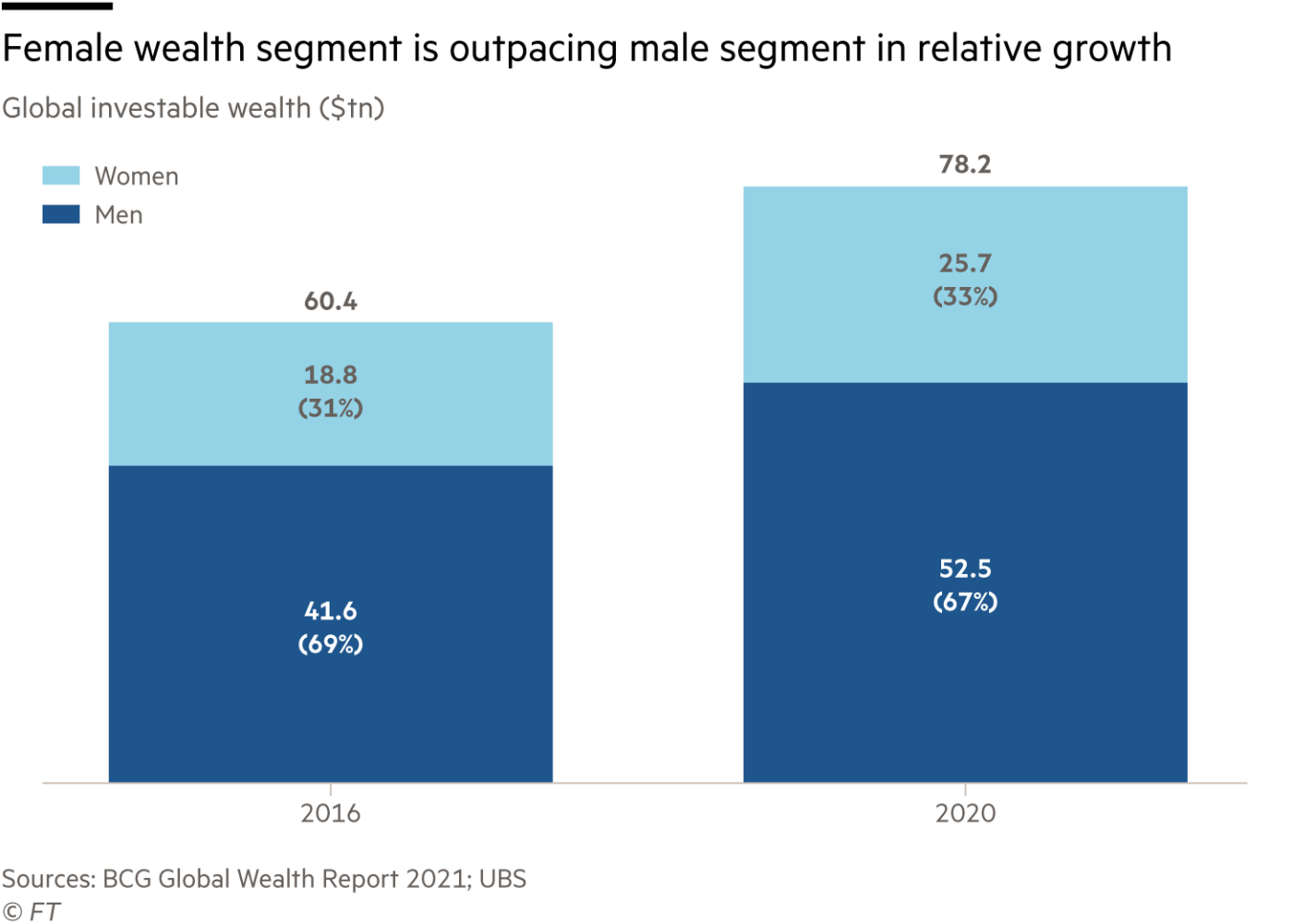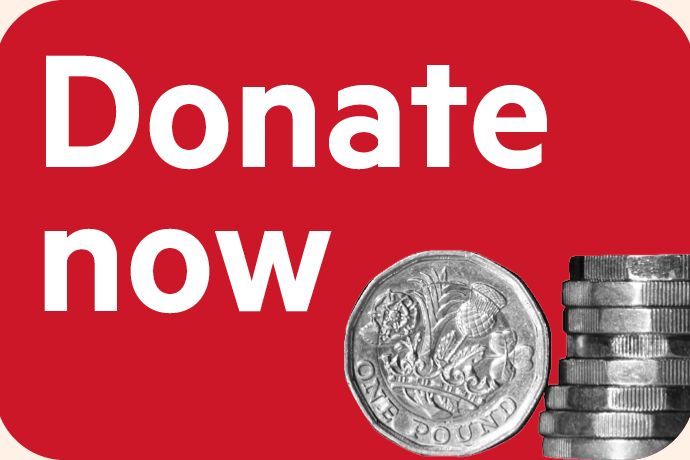This article is the latest part of the FT’s Financial Literacy and Inclusion Campaign
The pandemic has transformed our relationship with money, nudging millions of people around the world to think about their safety net, examine their spending and start investing to fund long-term financial goals.
Yet as we approach International Women’s Day on March 8, the narrative about women and money remains deeply depressing.
The gender pay gap has widened; our pensions tend to be puny; we live for longer, spend more of our lives caring for others and all of this negatively affects our finances.
Now the cost of living crisis is adding to our woes, with inflation eating away at cash savings while volatility returns to global stock markets.
As someone who has been writing about finance for more than 20 years, I worry that focusing on the negatives is a further barrier to engagement. If the financial odds are so stacked against women, should we even bother?
In the spirit of the 2022 theme “Break the bias”, I want to present some inspirational ideas about money that could shift your mindset. In the seven areas below, hopefully there’s a practical takeaway that women everywhere can act on.
Thanks to the FT’s Financial Literacy and Inclusion Campaign, this article is free to read and share — so if you’re inspired by the expert suggestions below, please pass them on — and feel free to add your own in the comment field below.
1. What financial independence feels like
For all the negativity surrounding women’s finances, I wish we could bottle the biggest positive — the feeling that financial independence gives you.
I would define this as moving from feeling overwhelmed by money to feeling more in control; making your own decisions, setting financial priorities; and developing effective habits like budgeting to help you achieve your goals.
“The problem is, traditional goals set by older generations [like buying a home] are not affordable for us,” say Margot and Alexia de Broglie, the 20-something co-founders of Your Juno, a new financial education app for Gen-Z women.
For the app’s users, financial independence is about “having freedom over your time”. The topics younger women most want to learn about are investing, negotiating a pay rise, becoming a freelancer and starting a business — and they want to learn from each other’s experiences.
“The element of community is so incredibly empowering,” says Alexia. “So often, money is a source of shame and stress, when it should be a source of freedom, empowerment and security.”
During the pandemic, many more of us shared our financial fears and experiences online. From Reddit threads to “FinTok” and social media “finfluencers”, women can recognise themselves, finding role models that the traditional financial world fails to offer.
While these personal interactions cannot replace regulated financial advice, real-life stories remind us that nobody is perfect. Knowing that others are experiencing the same challenges can be a source of strength and inspiration, as the huge growth of the online debt-free community has shown. It is also a reminder that we shouldn’t confuse financial independence with financial privilege.
Lynn Beattie, who blogs as Mrs Moneypenny, started a viral thread on Twitter last month [February] called “Can we all be a bit more honest about how we paid for our first homes?”
Viewed by over 2mn people, her tweet prompted thousands to confess they had only achieved this milestone by coming into an inheritance, receiving gifts or loans from their parents, or having a higher earning partner — as opposed to cancelling Netflix and their gym membership.
2. More women are investing — and so can you
During the pandemic, investment platforms and trading apps reported a new wave of female customers. Getting started is the easy part. As markets turn choppy, thinking about your investment strategy and understanding how tax breaks can boost your investments can help newer investors hang on for the ride.
“We spend so much time working hard earning the money, but not enough nurturing our wealth,” says Charlotte Ransom, founder of Netwealth. “For me, the challenge is all about getting people closer to their money.”
Unusually for a wealth manager, half of Netwealth’s clients are female. “Women tend to have much higher cash holdings [than men], so rising inflation is going to hit them harder,” she says.

She is convinced that one reason women tend to hold so much cash is because “they find it harder to engage with the personal finance industry”.
She argues that setting tangible long-term goals — such as a target income to aim for in retirement — is a much more powerful motivator for women than being pushed to buy a product. “Once women understand how their investments can line up against their goals, they generally show themselves to be very savvy investors,” she says.
How might you get closer to your money? At an International Women’s Day event years ago, I asked women to raise their hands if they had money invested in the stock market (a few were raised). Next, I asked people to put their hands up if they had a company pension. Nearly every hand went up — but the “default” nature of money invested in company schemes meant most had failed to make this connection.
“Investing is one of the hottest topics, yet [our users] don’t want to talk about pensions,” notes Margot from Your Juno, urging women not to overlook the “free money” of pension matching offered by their employer, and to educate themselves about investment choices.
Even so, studies show that a lack of money, rather than a lack of confidence, is a major reason more women don’t invest.
“Ignorance in finance is not bliss,” says Annamaria Lusardi, founder of the global financial literacy centre at George Washington University “Take some small steps to invest in financial knowledge, by setting aside as little as 10 to 15 minutes each week or month to read and learn about money.”
3. What does your partner earn — and where is the money?
Every woman should know the answer to this question, but a surprising number do not. But before having a conversation with your partner, try having one with your peers.
“In a similar way to a book club, why not meet your friends over dinner to start a conversation about financial topics?” suggests Patricia Astley, managing director at Julius Baer, a wealth manager.
She recently did so with five friends, and they went around the table sharing what they knew about pensions, life insurance and wills.
“Plenty knew little, or confessed they left these kinds of things to their partners,” she says. “In the UK, 42 per cent of marriages end in divorce and, even if you stay married, women live for longer than men. We need to have these conversations now.”

The pandemic has prompted one member of my own book club to tackle her (older) partner about their financial affairs.
“I just came out with it and said, ‘if you were to die of Covid tomorrow, where is our money, the passwords, the financial records for our business and the deeds for our house?’” she says. Talking more about money has now become a bigger part of their daily lives.
Jane Portas, a financial expert and creator of the Six Moments that Matter website, asks women if they know what their gender pension gap is — the value of their pension pot relative to their partner’s.
“Without a conscious effort to maintain and level up finances to recognise non-financial contributions like caring for children, these gaps start to build,” she says. “All too often, people don’t realise this until they split up.”
Don’t overwhelm yourselves by trying to have all of these conversations at once — tackling one topic at a time (perhaps over dinner) should make it more enjoyable.
4. The financial impact of having a baby
Much of the damage to women’s earnings potential occurs after they become a parent, but financial planning can help lessen the impact.
Tobi Asare, founder of the My Bump Pay website, suggests couples start planning “way before” they think about starting a family.
“The most important thing is to find out what both parents are entitled to in terms of maternity pay and parental leave,” she says.
The directory on her website shows that some employers offer much more enhanced packages than others. Importantly, more are recognising that men want to play a greater role in the early years. In the UK, shared parental leave is slowly becoming more common, but not every company offers it, and benefits vary hugely.
Asare says advance understanding of how your pay will be affected is essential for families to budget. Typically, maternity pay gradually tails off, and may even drop to zero.
“Ask your employer for a schedule of payments ahead of time, so you can see exactly how much maternity pay you will receive and when, and budget around this,” is her advice.

“So many women discover they can’t afford to keep up pension contributions, so they opt out, but this makes the gender pensions gap even worse.”
However, the greatest financial challenge is still to come. “The cost of childcare is always the biggest surprise that catches people out,” Asare says, recommending parents-to-be look at the cost of childcare options and find out if they will qualify for government assistance such as tax-free childcare.
5. Flexible working is not just for women
In the City of London, high-profile female bosses have been encouraging women to stop working from home and come back to the office.
If flexible working is something that only women are asking for, they fear this could unduly damage women’s pay and career prospects. Sadly, they stopped short of suggesting that more men should ask to work flexibly to better share childcare.
“Both men and women can benefit from the fact that the stigma around the flexible working conversation has been pushed aside,” says Patricia Astley. “Before the pandemic, many men wouldn’t approach their boss about this through fear of looking weak. That’s now eliminated, so these conversations need to be had at home.”
Charlotte Jessop, founder of financial education platform Looking After Your Pennies, encourages couples to examine their overall finances.
“When our children were small, my partner and I looked into how our take home pay would be affected if we both went part-time,” she says. They were surprised to find they would still hang on to 70 per cent of their income if they cut their working hours by nearly 50 per cent (Charlotte moved from five days a week to two, and her partner dropped down to four days).
Reducing their take home pay moved the couple into lower tax bands, plus they ended up spending far less on childcare as one parent was usually at home.
Other couples might find this approach could boost their entitlement to child benefit or qualify them for up to 30 hours per week of free childcare (the latter is withdrawn if one partner earns over £100,000).
6. How to hustle
The need for greater flexibility has long been a driver for women to go freelance or start a business. However, statistics show that female-owned enterprises often struggle to scale up, attracting a minute proportion of money raised from outside investors.
Just 1.1 per cent of funding went to female-led technology companies in 2021, according to research by Atomico, which notes that diversity is lacking on both sides of the deal. In 2021, it estimated that only 12 per cent of European venture capital general partners and managing directors were female.
Your Juno founders Margo and Alexia went on a training course for women to learn “how to present more confidently” to VC investors.
They were told that because men bidding for funding typically oversell themselves, investors expect founders to put a show on.
“Of course we questioned why we had to change our technique to fit around the mindset of male investors,” Margo says. Last week, the sisters raised $2.2mn in seed funding from a female-led board.
Jason Butler, the FT columnist and experienced angel investor, says that although women only account for “one in 20” people who approach him seeking an investment, his “strike rate” for investing in female-run businesses is 80 per cent, versus five per cent for those run by men. Why?
“I naturally assume that men believe that they’re great, and some of them are, yet I think many women don’t always believe in themselves enough,” he says.
If the numbers stack up, he believes backing female entrepreneurs gives him greater chances of a good outcome. “Women are less likely to have an ego, they’re less likely to bluster their way through or go into B.S. mode, and they tend to be harder workers,” he says.
“Now that is a generalisation, and I can’t really back it up with science. All I can tell you about is my experience. So I would say, if you’re a woman, don’t just think about going to women’s groups. There are many men who want to invest in female businesses.”
7. How to maximise your earnings potential
A “side hustle” can provide a valuable extra income, and potentially an avenue to develop your next career — but are you being paid fairly in your main hustle?
“Closing the gender pay gap requires you to be proactive and ask for a pay rise,” says Lusardi, accepting that part of the problem is that women are less likely to ask for an increase than men.
Advising women to develop a greater awareness of their earnings potential, she says if negotiations do not go your way, “sometimes, the best way to increase your salary is to move jobs”.
Women are much more likely to work part-time. After having children, switching to a four-day week is common, yet plenty of women are squeezing in five days’ worth of work in return for a 20 per cent pay cut.
“Another common problem is women staying in the same job for a long time after they’ve had children,” says Portas, noting how women sacrifice flexibility for pay and career progression.
However, the new “default” of hybrid working is evident in post-pandemic job ads, making conversations about flexibility much easier to start with a potential employer.
“In future, the conversation’s not just going to be about flexible working — it’s about flexible careers,” Portas adds. As we live for longer, we’re going to come in and out of the workplace, and people in their 50s and 60s are going to need to reskill. So moving jobs might not just be about pay; it could be about accessing other opportunities.”
The steep rise in women’s state pension age means that income streams from Isas, property investments and private pensions will all be needed to manage the transition from work to retirement.
“Even if you do not work because you are taking care of your family, try to stay employable,” advises Lusardi. “Develop skills that are useful in the job market, have a side hustle, keep connected or develop a network that can help you find a job in future.”
More than anything, she urges women to be vocal about their money issues — whether that’s asking for help, sharing experiences or campaigning for change.
“Women are not the minority, we are 50 per cent of the population,” says Lusardi. “We are a big group — we need to have a bigger voice, and to raise that voice to make sure change happens. We need International Women’s Day to remind men of all of these things.”
To read more about the FT’s Financial Literacy and Inclusion Campaign, click here
Free FT event
Would you say you are good with money? The FT wants to give women everywhere the confidence and knowhow to answer this question with a resounding “yes”!
To honour International Women’s Day, the FT’s Financial Literacy and Inclusion Campaign has put together a free online teach-in at noon on Thursday March 10 with four inspirational female finance experts.
Chaired by the FT’s consumer editor Claer Barrett, the panel includes Jane Portas, author and creator of the Six Moments that Matter website, Ola Majekodunmi, founder of the Instagram platform All Things Money, and Tobi Asare, founder of the My Bump Pay platform that helps women navigate through maternity leave and beyond.
The topics they will tackle include what you need to know about money when starting your career, how to join the growing numbers of women who are investing, the finances of having children, and whether flexible working can help close the gender pay gap.
Listen to how they’ve mastered money in their own lives — and get the chance to put your questions to them.
To register to take part in this free online session, simply visit FT.com/womenevent.
This event is intended as a general discussion around financial topics, and does not constitute an investment recommendation or individual financial advice.
